Text
personal aesthetics
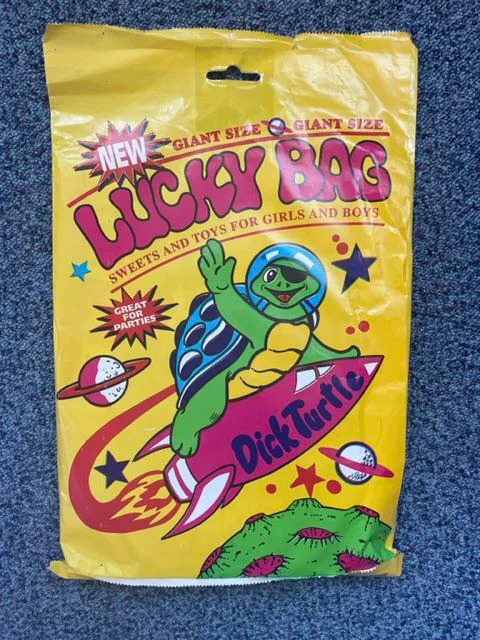
i'm often afraid to look directly at what i want, in case it scatters and disappears, maybe that's cowardly, i don't know. but i've always felt like, to get what you want through intelligence or hard work or talent is to diminish that thing somehow, to turn it into another empty token of the will. and that the only way things come with their original charge of desire intact is as a miracle, as specifically the one thing that we didn't dare to think about, didn't dare wish for.
---
so you can spend your time vamping, drawing circles around the magic incantation. and these circles can be interesting enough in themselves. you try something or find something once, and it works so you do it again, again and again, until it becomes a stock phrase, a familiar presence in the bag of tricks. and maybe over time it changes, maybe it becomes one of those things that passes far enough through familiarity that it becomes strange to us again, we pause and feel confused at how well our own hands seem to know these contours, maybe they start to wear away, or maybe we start to wear away ourselves, we have to do things differently, not being able to rely upon the old sharpness. so they develop their own histories. but it's a false history unless we somehow view it in tandem with that of their counterparts, the non-tools - whatever it was that couldn't be added to the bag, whatever we couldn't bring ourselves to try to fake.
---
i feel averse to art that has no dead parts, no listlessnesses, no flubs - "nothing but the best". as if meaning and value were so rare that they could never be left to chance. a paranoia that diminishes the thing it's trying to celebrate, converting it to yet another luxury good to be stockpiled by those of means or exquisite sensitivity. i think the only thing you can do when you run across the good is to let it go again. i think whatever you risk losing in doing so is balanced out by the beauty of the notion that there's always more to find.
---
i like lucidity in art because it's an acknowledgement of its own limits - a lucidity that means marking the points where lucidity itself can only stop talking and start to gesture.
---
art as a lucky dip bag that holds equal chance of turning out to contain a plastic whistle, two lollipops, a magic ring or somebody's hand.
---
i like irony because it's a way of holding two ideas at once. imagine i'm sad, so sad, so forlorn, so overcome with weighty despair that all i can do is throw up into a trash can. now imagine a member of janitorial staff finding it the next day and going what the fuck? by putting these things together with different levels of emphasis you can have as comic or as tragicomic an effect as you could like - or if you like you can hold them both at a remove, emphasising the broad scope of your own vision. but the kind of irony i am interested in is whatever could hold both these things in suspense - each one chafing against the other, holding off on final meaning as if waiting for the scales to tip, like a make-your-own-allegory kit where the final part rolled under the couch.
---
sometimes i think about the old idea that wanting anything is folly, is childish, that as soon as you get it you'll just want something else. and there's something to this, but i hate that smug moralism, that defensive incuriosity, and i feel drawn to people brave enough to continue wanting even knowing how futile it might be. so maybe the value in chasing something is in getting to want something else, layer after layer of discarded promise building up, becoming stranger, less straightforward, the path of your desire getting cluttered with your own debris, having to wind, become sidetracked - like the snake from "snake", growing longer as it eats apples(?) in the void, forever surprising its own body at odd angles, circling its own old movements. is this what william blake meant by "if a fool would persist in his knowledge he would become wise"?? see how long you can avoid self knowledge while eating fruit. eve simulator 2000.
in magic wand there's a part where you find the magic wand, this thinly sketched signpost for alterity, desire, and it makes a weird noise and then the world is changed, in a way it's hard to read as good or bad. certainly more cluttered - the plains outside are now covered in debris, gigantic heads and hands, pictures of the demiurge. there doesn't seem like much to choose from between these places, so maybe the only thing you've gained is to have seen them both, the old and new, and have the old slide a little further into memory, the secret alchemical medium that can absorb all contradictions.
---
i always feel like to represent something is to travesty it, to turn it into an icon of the unliving - that to put whatever you most cherish, love or friendship or whatever, into a work of art is like putting it inside the mouth of a corpse. if these have value it's as human things while art draws its lustre from being inhuman. that being said… there's something moving about the frozen and unproblematized emblems of pleasure that bob around the screen in a videogame, the hearts and blue skies, candy worlds and golden bells. they become moving because nobody believes in them anymore, because there's no insistence that these things might actually represent the good - they're harmless tokens, light as air. in the very indifference with which they seem to regard how near or far they might be from actual happiness there's something tensionless and dreamy, forgetful and beautiful. we might suspect that a secret substitution's taken place.

105 notes
·
View notes
Text
·Elvis de Baz Luhrmann·
Dir.: Baz Luhrmann. DP.: Mandy Walker. Guión: Baz Luhrmann, Craig Pearce, Jeremy Doner, Sam Bromell Cast: Austin Butler, Tom Hanks, Richard Roxburgh, Olivia DeJonge... Trailer.
En julio no es que haya vista una grandísima cantidad de cosas, pero de todas formas haré probablemente un post resumiendo un poco todo lo que he estado viendo/haciendo, pero esta primera entrada voy a dedicarla única y exclusivamente a una cosa:
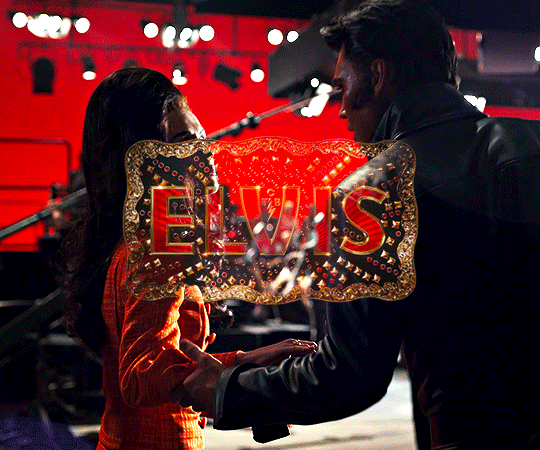
Para empezar, una de las últimas películas que fui a ver al cine en Junio fue la Elvis de Baz Luhrmann, con la que sigo completamente obsesionado (en serio, id a verla si no lo habéis hecho ya), por lo que procedo a tirar aquí de la forma más extensa (y probablemente desordenada) lo que pienso sobre la peli.
Antes de nada, Austin Butler (y el resto del reparto):
Es una cosa demencial lo de Butler aquí, lo da absolutamente todo en cada escena y consigue que sea una de las actuaciones más magnéticas que he visto no sólo en los últimos años sino seguramente también en lo que llevo de vida. No hay un sólo segundo en el que respirar, son dos horas y cuarenta minutos en los que no puedes despegar la vista de la pantalla, en gran parte por su culpa.
Esto creo que lo consigue el bueno de Baz gracias a una cosa muy inteligente que hace con su guion, y que para muchos es una de las grandes pegas de la película. Este gran acierto, en mi opinión, es contar la historia a través de los ojos de su villano, el Coronel Parker.
Soy consciente de que el papel de Tom Hanks, pasadísimo de vueltas, ha sacado a muchísima gente de la película (no es en absoluto el único aspecto así), pero a mí no sólo me ha funcionado su maquiavélico villano de dibujo animado, sino que también me ha parecido uno de los puntos más interesantes de la peli.
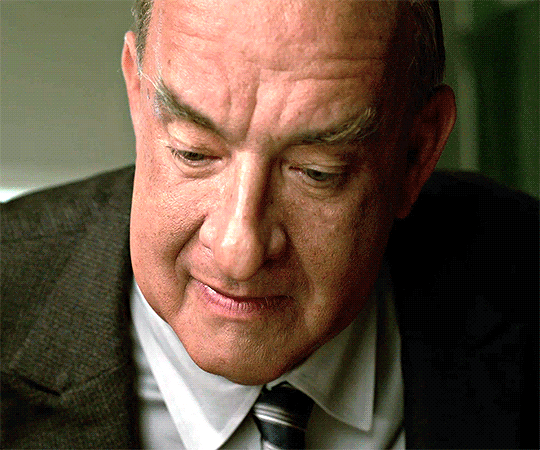
El bueno de Parker es un personaje bastante misterioso en su contraparte real, y Luhrmann y Hanks lo aprovechan para crear con esta caricatura una especie de ente omnipresente que representa todas las malas decisiones que llevaron a la figura de Elvis a caer desde lo más alto. Su acento extrañísimo de sabe Dios dónde, sus movimientos exagerados y cargadísimos de prótesis de silicona y demás parafernalia a mi me lo venden perfectamente como uno de los mejores (si no directamente el mejor) villano de comic del año.
Otro punto al que suma el POV de Parker es a construír a Elvis como...
Una figura Larger Than Life:
Y es que para mí, la película es una enorme escultura de oro y diamantes dedicada a la figura de un personaje más grande que la vida misma. En este sentido la película está mucho más cerca en su estructura y personajes de lo que sería una de superhéroes, que de lo que estamos acostumbrados a ver en un biopic musical de los de sota-caballo-rey.
Luhrmann demuestra aquí verdadera ADMIRACIÓN por la figura de Elvis, una figura que está claramente idealizada, omitiendo por completo y sin ningún tipo de disimulo todo lo que no le interesa. Esto es, definitivamente, un punto a tener en cuenta. Quiero decir, podría entender que a alguien no le interesase lo más mínimo una idealización así, pero aquí me funciona.
Quitándonos de encima el tema de la tremenda hipérbole que es la peli, muy bien retratada su figura, tanto por la dirección de Luhrmann (a ello voy ahora) como por lo absurdamente creíble que está Butler.
Baz Luhrmann, te quiero mucho
Ahora lo verdaderamente importante: Baz "no tengo ningún tipo de vergüenza" Luhrmann.
Es un tío que siempre destaca por su dirección, vale, sí, pero es que lo que hace en Elvis es, sencillamente, uno de los ejercicios de autoría más puros, espectaculares e interesantes que he visto en mi vida. Es el Luhrmann de Moulin Rouge! pero multiplicado por un millón. Está desatadísimo, en serio, pero sin perder en ningún momento el pulso de casi tres horas de historia que tiene entre manos. Hay una cantidad de decisiones absolutamente demenciales que solo funcionan si eres un genio, y Baz lo es, yo que se, completamente a sus pies.
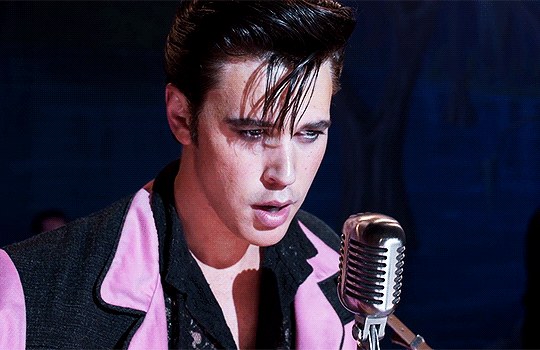
Hay un no-se-qué súper pulp en cada fundido, en cada zoom, que sostienen este enorme monumento, y que le da ese toque tan de comic que tiene. Las secuencias musicales son increíbles, todas las partes, absolutamente todas, lo dan todo. La secuencia del If I Can Dream o la del último Unchained Melody, así como la del primer Trouble, van a vivir en mi cabeza durante muchísimo tiempo.
La música es otro tema importantísimo, y es que como pasaba con Moulin Rouge! Luhrmann utiliza la música de una forma interesantísima, que analizada de forma pausada y con un poco de ganas daría para tesis doctorales enteras. Y es que los temas de la peli son una mezcla de temas originales de Elvis, versiones con la voz de Butler, remixes, canciones actuales y HASTA TOXIC DE BRITNEY SPEARS HOLA. ¿Por qué? porque qué mejor manera de demostrar el alcance de un artista como Elvis que mediante sus influencias posteriores. La película no se queda en lo que significó Elvis en su momento, sino que abraza también todo lo que puede aportar hoy en día. Genio.
Simplemente, nadie hace cine como Baz Luhrmann, y ojalá saliesen 20 como esta cada año.
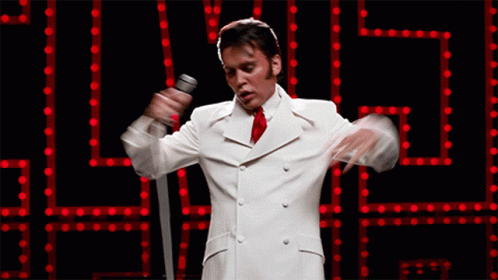
Hasta aquí la turra, a ver cuándo me pongo con un resumencillo de Julio, venga, hasta chao.
---------------------------------------------------------------------------
Mi top de todo lo que llevo visto de este año si os interesa lo tengo en letterboxd.
---------------------------------------------------------------------------
3 notes
·
View notes